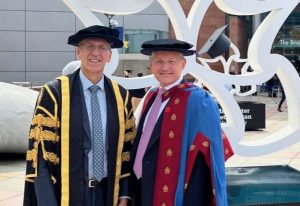Cox applauds Chancellor’s devolved business rates move

THE director of the Institute for Public Policy Research North (IPPR) Ed Cox has hailed Chancellor George Osborne’s Conservative party conference speech – in particular his stated intention to give local areas new powers over business.
Under Government plans councils in England will be able to set and keep hold of the business rates raised in their area.
Former Labour minister Lord Adonis is to lead an independent National Infrastructure Commission and Osborne also announced plans to sell shares worth £2bn in Lloyds to private investors next spring.
Cox said: “George Osborne should be applauded for taking the devolution agenda into a new bold frontier by giving local areas new powers over business rates.
“The real prize of the devolution agenda is for local areas to have powers over how they collect, raise and spend revenues and this is an important first step towards that goal.
“It will give local leaders the powers and incentives to create greater prosperity – a power which for too long has been held in Whitehall and stymied a rebalancing of the economy.
“Business leaders want to see these decisions made closer to home and need to be closely involved in how the new rates are set and used.”
Cox said, however, that the Chancellor need to set out what the proposals mean for the revenue support grant and its overall redistributive impact on local government finance ahead of the Spending Review.
“Unless we retain some redistributive mechanism, there is a significant risk it will starve poorer areas of crucial support and allow wealthier ones to collect all the riches.”
Cox’s comments were echoed by Greater Manchester Chamber of Commerce’s head of research and policy, Christian Spence, who said: “The Chancellor has today announced what is arguably the largest single change to local government finance in 30 years.
“The abolition of the uniform business rate across the country means a reversion to the system that existed before 1990, where local authorities are able to set the tax rate on business property in their area independently.
“Also, instead of the revenues raised from this tax being transferred to Whitehall to be redistributed to local authorities, each will keep 100% of the business rates that they receive and the revenue support grant to local authorities will be abolished.
“All local authorities will receive the freedom to reduce the business rate multiplier in their area, and those with elected mayors will, with the support of businesses in their area, be able to add levies to support investment in infrastructure.”
In his speech, Osborne said business rates shake-up was, he said, “the biggest transfer of power to local government in living memory”.
Some 89 local authority pension funds in England and Wales would be merged into six regional funds to encourage them to invest in major infrastructure projects.
And there would will be infrastructure investment of £5bn funded by asset sales with an airport expansion decision by Christmas.
The Chancellor told delegates that while he had grown up in London, he had been “changed” by representing a constituency near Manchester (Tatton) and convinced of the need to increase investment in the North of England.








